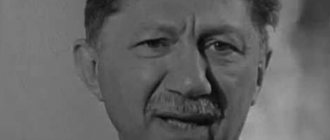Each person has his own views on life, aspirations, ideals, interests, desires and goals, and in psychology the totality of this has a name - personality orientation.
Orientation is formed depending on upbringing and environment, because any person is influenced by society to some extent. Personality orientation is an important characteristic of a person; in psychology it is also replaced by the term “dynamic tendency”, which affects his character and activity.
Structure
The psychology of personality orientation has a complex structure, which consists of several parts:
- Motives. Needs that motivate an individual to satisfy them.
- Needs. Feelings that make an individual feel the need to obtain something in order to achieve comfort.
- Interests. Selective attitude towards a significant subject. Interests may relate to the material or spiritual plane.
- Ideals. A person relies on them when solving problems.
- Value orientations. A system of relations controlled by society. The individual accepts or denies the attitudes of society.
- Worldviews. Belief system.
- Beliefs. Facts about society, the structure of the world. The individual believes them unquestioningly. It is difficult to dissuade him of his personal beliefs.
Afterword
Thus, personality orientation is a psychological property that implies a set of internal attitudes, aspirations and life goals. Some people see the purpose of life in creativity, some in work, some in crimes. The orientation of a person stems from beliefs and determines a person’s actions.
Orientation reflects the content of a person as a participant in public life. It reflects what a person does and how, how he relates to his responsibilities, what value and usefulness he represents to society.
Forms
Shapes:
- Attraction. An unconscious natural desire that manifests itself at the level of instincts. It influences the formation of preferences and motives. With attraction, the main goal is not realized.
- Pursuit. It is necessary to achieve your goal and satisfy your desires. With the help of aspiration, an individual overcomes the difficulties encountered on his way to the goal.
- Tendencies. Orientation towards a specific type of activity. Appears when a person wants to achieve what he wants.
- Wish. Interest in an object that a person is aware of. At this moment, the individual understands what he wants, but does not know how to get it.
The forms of personality orientation determine the productivity of the individual.
Self-concept
"I-concept"
is a dynamic system of a person’s ideas about himself, which includes a person’s awareness of his qualities (physical, emotional, intellectual), self-esteem, as well as subjective perception of external factors influencing a given personality.
“I-concept” is close to the concept of “self-awareness”, but rather “I-concept” is the result of self-awareness.
“I-concept” arises as a result of a person’s social interaction with his environment. The environment influences the formation of the “I-concept”, however, then the “I-concept” begins to determine the way a person interacts with the social environment.
Classification
In psychology, there are 4 classifications of personality orientation. Each of them has certain characteristics.
By openness
Direction can be secretive or true. The hidden cannot be noticed in ordinary life situations. It only manifests itself during a crisis or unusual situations.
By structure
Kinds:
- personal;
- collective;
- business;
- emotional;
- social.
According to the individual's personal position
The direction is:
- Depressed. It manifests itself as low self-esteem, which prevents you from working normally and doing your usual things.
- Selfish. Sustained self-interest prevails. The opinion of society or others is ignored or underestimated.
- Humanistic. It is manifested by a stable positive attitude of the individual towards society.
- Suicidal. Prevails among people who have partially or completely lost value for themselves, relatives, and loved ones.
- Business. A stable system of motives that have a direct impact on an individual’s activities and their results.
- Collectivist. The individual's stable orientation towards contacts with society.
By area of activity implementation
The direction is:
- sports;
- cultural;
- professional;
- research
Kinds
In psychology there is a concept of different types of orientation. They cannot be the best or the worst. Each type determines the behavior of an individual in various fields of activity, his behavior in certain situations.
- Personal - characteristic of people who are very strong, strong-willed individuals. They are self-confident, rely only on their own strengths, move towards their goal independently, without expecting outside help. Very often, such individuals are considered selfish, as they are focused on building and implementing their own plans, without being interested in the opinions of others. A person with this type of orientation is very purposeful and responsible. He knows how to organize activities and follows drawn up plans. An individual focused on self-interest is able to take responsibility and will not look for blame among others. Negatively, personal focus leads to a need for solitude. It is difficult for such individuals to redirect their responsibilities to anyone.
- Focus on others – characterized by an increased need for communication and dependence on public opinion. The individual feels uncomfortable when performing a task on his own; approval from the outside is very important to him. Individual plans and aspirations in this case are impossible. Going beyond the rules accepted in the environment is considered a disaster. Focus on other people allows the individual to be interested in social life and take an active part in all events. Such people are loved in the team and in the family, they are reliable performers, always ready to help. Since a healthy environment is more important to them than personal comfort, other-oriented individuals find the key to any character and get along with everyone.
- Business – this type of orientation allows people to successfully conduct any business, not only in business. They know how to find a way out of any situation and take advantage of any circumstances. A business approach allows you to find a favorable position not only for yourself, but also for the team or any surrounding society. People with a business type of orientation often become the soul of the company; they themselves love society, but at the same time they do not allow themselves to obey other people’s rules.
- Emotional – characteristic of individuals who have a very highly developed ability to emotionally empathize with current events. A person of this type is very sensitive to the pain of others, responsive and always ready to help. Emotional orientation, as a rule, is inherent in people of art, as it allows one to penetrate deeply into the mood of a fictional work and character. Emotional instability and frequent mood swings bring such an individual many anxious experiences, often for an invented reason.
- Social – characterized by increased observation of events occurring in human society. A socially oriented person often becomes a political or public figure. He can lead, he can obey, but his activities must be connected with society. Such a person always subtly senses what is happening and is able to predict the development of events.
Functions
Functions:
- Guide. Considered the main one. With its help, a person finds the path to the intended goal and avoids obstacles. In some part it is carried out unconsciously.
- Encouraging. It is needed to provoke activity on the part of a person. It can motivate, provoke, inspire or condition him to action. The motivating function is influenced by motives, desires, interests, goals, worldview, and ideals.
- Meaning-forming. Needed to give meaning to achieving goals. The function helps the individual obtain the desired result.
- Regulatory. This function is influenced by needs, motives, and their hierarchy
Definition
Each person has his own views on life, his place in the world, on society. The orientation of a person is her priorities and worldview, hobbies and needs, goals and desires. It develops largely due to upbringing and environment, and depends on the level of morality of society. Thus, a child often adopts his parents’ worldview, their fears, interests and priorities. Relatives are undoubtedly influenced by the social environment.
In a religious society, direction is greatly influenced by faith. A devout Christian will see his path in serving God and people; a prudent Chinese is often guided by the saying “if you are not caught, you are not a thief.”
Personal orientation is the path to self-realization and goals.
Motives
Exist:
- Motives for preventing failures. The individual takes careful actions and weighs every step. In this case, less significant actions are performed.
- Motives for achieving the goal. When solving problems, the maximum amount of resources is used.
Types of connection between motivation and orientation:
- Ideological and spiritual. A person has a desire to study the universe. The individual begins to think in the direction of development and preservation of humanity.
- Instinctive-physiological. It is manifested by the desire to satisfy bodily needs in order to preserve oneself and one’s species.
- Individual and personal. The desire to satisfy one’s own needs, maintain individuality, and self-expression.
Motivated actions often take place against the background of internal contradictions. A person has competing, multidirectional drives. Motivation helps to temporarily suppress them in order to achieve something faster.
Values and needs
A person’s attitude to reality is determined primarily by those needs that he considers necessary for himself. Needs create specific desires and requests, and this, in turn, adds up to the general psychological orientation of the individual. Its main components are value-semantic formations based on the needs and aspirations of a person in accordance with his standard of living, demands and relationships with others. This may include the desire for power and influence, the need for a certain social status, the values that a person wants to have as a result of his efforts and efforts. This also includes self-esteem - a person’s ability to adequately evaluate himself in relation to the surrounding reality.
In addition to the goals that a person sets for himself, the ways of realizing them are also important. We have all been able to observe this in practice many times. For some, “the end justifies the means,” but for others, specific methods will be unacceptable from an ethical point of view. This difference is primarily a consequence of parental attitudes. Parents pass on the lion's share of their value system to their children, showing their example to the child from early childhood. Although sometimes they do it unconsciously. Therefore, many well-known psychologists advise paying maximum attention to the peculiarities of child psychology, child-parent relationships and pedagogical issues. Psychologists V. A. Slastenin and V. P. Kashirin consider, for example, problems such as personal psychology, theoretical and methodological aspects of raising and teaching children, general issues of pedagogy, maintaining mental health, and regulating interpersonal relationships. Scientists pay special attention to professional child psychology.
Impact on an individual's life
Ways of influence:
- Orientation towards interactions. They appear in people who, for the sake of a normal psychological state and effective activity, constantly interact with a group of people. The individual's opinion is suppressed by those around him; he cannot take leadership over others. Such workers are characterized by constant joint activities with someone.
- Business. The prevailing motives are those related to obtaining the desired result for the group. People try to take everything into their own hands to control the situation. They communicate with other people and motivate them to be active.
- Personal. Personal desires and needs prevail over the opinion of the majority. People care only about themselves and do not pay attention to others. In life together, this will be an active manifestation of selfishness on the part of one of the partners, in work - ignoring workers, achieving personal goals even if they run counter to the work process.
How to find out your type
There is a test for this. The orientation of a person can be found out in 5-7 minutes; completing the questionnaire will not take more time. In total, it includes 30 items with three answer options. These are not questions, but proposals that are proposed to be continued. You need to mark two options out of three: one is “most of all”, and the other is “least of all”. Here are examples:
- Question: “What gives me satisfaction in life...” How can I answer: most of all, the realization that the work was completed successfully. Least of all is the assessment of my work. The third option, which remained unmarked, sounds like this: “The consciousness that you are among friends.”
- Question: “I’m glad when my friends...” How can I answer: most of all - when they are true and reliable. Least of all, they help outsiders when given the opportunity. The third option, left unchecked, sounds like this: “They are intelligent, have broad interests.”
- Question: “If I could become any of the options offered, I would like to be...” How can I answer: most of all - an experienced pilot. Least of all - the head of the department. The third option, which remained unmarked, sounds like this: a scientist.
Also, the personality orientation test includes the following questions: “When I was a child, I loved...”, “I don’t like it when I...”, “I don’t like groups in which...”, etc.
Based on the test results, the person will know the result. It is recommended to answer without thinking, since the first answer that comes to mind usually reflects the true thoughts.
Independent determination of personal psychotype
Characteristics of psychotypes:
- Purposeful. They love classic clothing styles. Facial expressions are confident and authoritative. They use bright gestures to mislead the interlocutor and gain benefit from it. They often display an arrogant tone. Speech is confident. When communicating, they offer their own topics that interest them; they don’t like to talk about anything else. They maintain consistency in the presentation of thoughts and live according to a strict schedule.
- Demonstrative. They like to wear non-standard, eye-catching clothes. They often act contrary to social norms in order to stand out from the crowd. They like to be leaders in noisy companies. Speech is expressive, emotional, often diluted with dramatic pauses. They don’t hide their emotions and love to communicate. It's easier to listen to them than to talk to them.
- Stuck. Confident individuals with a hard, direct gaze. Speech is sluggish, movements are clear. Rarely express emotions. They love facts and always use them in conversations.
- Excitable. They love sporty clothing. Facial expressions are weak and sluggish. The look is aggressive, direct, sometimes furious. Speech is sluggish, but firm.
- Strange. They live in an illusory world.
- Cheerful. Facial expressions are energetic and lively. The movements are active, which often leads to injuries. They start talking, which is why they lose the essence of the conversation.
- Sensitive. Dress in pleasant, soft clothes. They have uncertain, weak facial expressions. Gestures are smooth, speech is quiet.
Personality orientation in psychology is a psychological property that consists of life goals, aspirations, and internal attitudes. By studying it, one can understand the reasons for the different behavior of an individual in public life.
Professional orientation
Each profession requires the possession of specific character traits that are necessary to achieve success in that field. In psychology, several personality types are defined:
- Realistic type
They prefer physical labor and working with real objects. The following professions suit them most: builder, technician, mechanic.
- Conventional type
The personality is attentive, focused and calm in nature. Such people are responsible and always complete their work on time. Preferred professions: librarian, merchandiser.
- Intelligent type
These people love to think and learn new information. They love to do research work. The most suitable professions: teacher, writer.
- Enterprising type
Such individuals have leadership qualities and are excellent at managing. The following professions are suitable: manager, businessman.
- Social type
People with a well-developed sense of empathy who strive to help others. The following professions are suitable: doctor, social worker.
- Artistic type
Such individuals do not like to work according to a schedule and put themselves into any kind of framework. They are unpredictable and creative. Best professions: artist, poet.
Humanistic direction in personality theory
Self-actualization theory by A. Maslow
The term “humanistic psychology” was coined by a group of specialists working on the problem in the 1960s. This direction developed as third force psychology. It presupposes an interpretation of human nature diametrically opposed to that which was generally accepted in the widest circles of researchers of human souls.
Maslow's supporters propose adhering to the following fundamental principles, in their opinion:
- Man is a thinking being who freely chooses his method of action.
- Each individual is in constant development.
- Each person chooses for himself how to live his life.
- The existence of each individual person is unique and inimitable.
Humanistic psychology of C. Rogers
Rogers continued to develop the theory of personality and as a result of the work done, the following conclusions were drawn:
- Each person is constructive, his essence is realistic and aimed at constant development.
- Every person is a positive being aimed at harmony.
- The development of each person is carried out on the basis of innate capabilities.
- Each individual person has a natural desire to move towards independence and social responsibility. All this is based on creativity and a mature approach to life itself!
Behavioral direction in personality theory
Watson's behaviorism
This teaching was a continuation of the development of the philosophical school of the 16th century, called “British Empiricism”. The essence of this direction is that all people receive knowledge and ideas empirically - through the senses, as well as as a result of life experience. Initially, the human mind is a blank slate, on which certain imprints are gradually applied. Proponents of this movement also believe that observation allows us to form a stronger basis for knowledge than thinking.
Basic provisions of Skinner's theory
A Harvard University professor developed the theory of operant conditioning, and he considered all theories to be psychologically speculative. That is, based on assumptions. Skinner believed that the human body is a so-called “black box”, inside of which there are emotions, motives, drives, etc. It is impossible to measure all this objectively.











